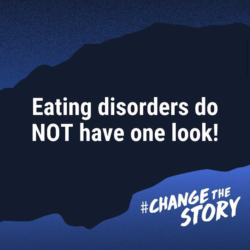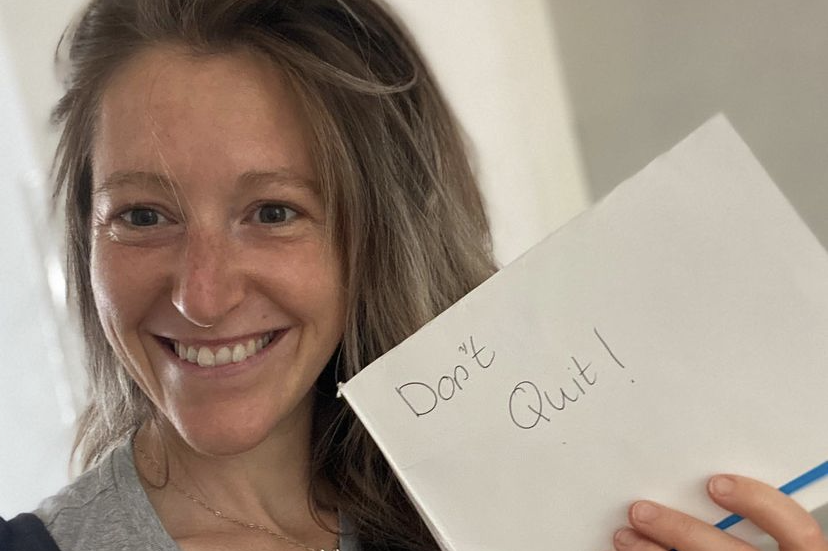Mental health stigma comes in all shapes and sizes—except when it doesn’t: “People think that to have an eating disorder you have to be stick thin, but the reality is you can be any size or shape,” says Hope Virgo, 32, who lives in Bristol, England.
Admitted to a mental health hospital in 2007 for anorexia, Virgo had relapsed in 2016 and, feeling suicidal, tried to check herself into a London eating disorder center. But she was turned away: “I wasn’t thin enough for support.”
Virgo, now in recovery, became an activist, dedicated to changing the system through words—she’s authored two books and writes about EDs for Metro and The Guardian—and her #DumpTheScales Change.org. petition. Currently at more than 122,000 signatures, it asks the British government to review and revise the eating disorder (ED) guidance given to healthcare providers, a topic Virgo’s discussed several times at Number 10, otherwise known as 10 Downing Street, or the Prime Minister’s office.

Some progress has been made. In 2015, the Diagnostic and Statistical Manual of Mental Disorders (DSM), which outlines the criteria for mental health conditions, updated the requirements for an anorexia nervosa diagnosis: In the DSM-4, a person had to be at or under 85 percent of the “ideal” body weight; the DSM-5 broadened this to “significantly low weight in the context of age, sex, developmental trajectory, and physical health.”
But this still places the emphasis on very low weight, when, according to the National Association of Anorexia Nervosa and Associated Disorders (ANAD), less than 6 percent of those with eating disorders are medically diagnosed as “underweight.”
GOTTA READ: The Women’s Guide to Eating Disorders
Virgo says the DSM changes aren’t enough. “It’s a step forward, but this is not seen on the grounds, and without adequately funding services and fighting the stigma, rules like this won’t help anyone.”
That’s partly because the EDs-are-all-about-weight misconception doesn’t just affect diagnosis: It influences recovery, too. “As you put on weight, people think you are fixed—but this is totally wrong and it makes recovery so much harder,” Virgo says. “My weight seemed to go up and my brain took so much longer to change how it felt about everything.”
More from Virgo’s conversation with Mental:
It’s a Misunderstanding… “that people develop eating disorders because they want attention. People with eating disorders want absolutely no attention! I spent so long hiding my illness and was devastated when people started to find out.”
EDs in Movies: “A lot of movies make it out that having anorexia is this super cool thing to do. But it is not fun and it is not cool! The good thing is these movies do get people talking about mental health. There needs to be more involvement from people who have been through the illness to make sure these are more accurate.”
Running and Mental Health: “Running was a massive part of my illness but also something I absolutely love and has helped to change may understanding around food. Exercise can be something I may feel tempted to obsess over.
“My relationship with running has been quite challenging, and it is something I do have to be mindful of. I was lucky because in hospital they taught me how to run and fuel adequately, and since then it has been a learning curve. I have to be accountable to people around me, be aware of why I am going, and be strict with myself. I think so many can start to exercise for the wrong reasons, and the eating disorder as a coping mechanism can turn into that, and as society praises obsessive exercise it can sometimes feel hard to know if we are doing too much.
GET MORE MENTAL! Sign up for our free weekly newsletter
“With my running, I was able to shift my thinking, using it as something that gave me headspace, learn to be honest with those around me, and as soon as the thought of rest days gave me anxiety, I had to stop in my tracks and rethink my relationship with it, asking myself what was actually going on in that moment. Eating disorders thrive in secrecy, and so bringing out behaviors into the light is always key for healing. When I feel myself getting triggered to exercise too much, I see my personal trainer, make sure I have some days off, and I talk about it.”
On Her First Book, Stand Tall Little Girl: “I wanted to paint an accurate picture of the ups and downs with recovery and to make sure people know that they are not alone. It can feel so isolating when you have a mental illness.”
Dealing with Triggers: “Triggers look very unique to people, but when I am triggered by something I tend to get an automatic reaction to an eating disorder behavior thinking it will keep me safe and protect me. So I don’t act on it, I have to distract myself, I journal my way through it and also make sure that I keep eating during that time. The eating disorder tries to pull us back in and seduce us, romanticizing all it did for us—so it is vital we don’t let it do that but remind ourselves of all the negatives of the eating disorder.”
“Remission” or “Recovery”? “I call it recovery. I think it is about learning to manage ourselves through this. for everyone, recovery will mean something totally different, and as individuals that is totally okay. We must not put too much pressure on ourselves to be at a certain point.”
Best Advice:
- “Having people around you that you trust and feel accountable to. People who can challenge you with your recovery and be direct when necessary. So many settle in recovery in a midway point with food rules and beliefs, and unless we start challenging those we are going to remain in a place of stuckness. For me, I had to start to challenge this through making lists of fear foods and starting to try them. Sitting with the hard feelings and realizing I could do this and it would make life so much better and so much more freeing.”
- “Know what your triggers are and how to cope with them. For example, if you find certain times of the year triggering (e.g., holiday seasons), know how you are going to manage those times, whether it is having a plan of action around food or backup meals available. Make sure you find the time to plan! I guarantee it will help.”
- “Talk talk talk! This is so so important in recovery! We need to keep talking about how we feel. Yes, situations can’t always be fixed, but by talking it massively helps. Talk about everything! Stuff that you might not think is an issue in the grand scheme but something that maybe is holding you back. It is about opening these conversations up further and getting trained therapeutic support where necessary. I do find it helpful talking to some people who have been through things, but it is always important for me that they do are on their road to recovery.”
Hope Virgo’s latest book, You Are Free (Even if You Don’t Feel Like It), explores mental health and spirituality and is available for pre-order. You can follow her on Instagram at @hopevirgo_.
DSM-5 Criteria for Anorexia Nervosa: https://www.aafp.org/pubs/afp/issues/2015/0101/p46.html
Percentage of “Underweight” People with an ED: https://anad.org/eating-disorders-statistics/





